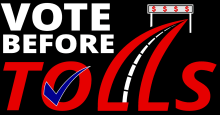Mission
The Vote Before Tolls Committee exists to give Oregon voters direct input on state and local tolling decisions.
Congestion Tolling on the I-205 Corridor (near West Linn/Oregon City) and on I-5 (near the Rose Quarter) is being considered as a result of Oregon Legislation HB 2017 where tolling was identified to help fund selected Transportation needs and projects. We are working to organize and empower citizens to have a voice and a vote, on these and future tolling decisions!
About Us
The Vote Before Tolls Committee is a grassroots, citizen-driven non-partisan statewide effort.
Goals
- Legislation calling for a public vote on highway tolls before they go into effect
- ODOT transparency on their decision processes, toll amounts, use of funds, and plans for sunsetting of tolls
- An open discussion as to how tolls fit into ODOT’s short- and long-term funding strategy for local and state-wide projects
Beliefs
- Highway tolls are a new form of taxation in Oregon. Taxpayers do not trust Salem and ODOT to act in the best interest of the general public and businesses.
- Oregonians deserve to have a say at the ballot box before they are tolled to use existing highways.*
- Automobiles, trucks, bicycles, public transit, and sidewalks serve different, but co-existing transportation needs.
- It is essential that Oregon have high quality and efficient roads to serve the diverse needs of its people and businesses.
- The current Oregon Tolling Proposal
- Is not equitable and places a disproportionate financial and traffic burden on segments of citizenry and businesses
- Is a gateway to expanded and permanent tolling across the Portland tri-county region … and the rest of the state
- We do not oppose traditional tolling that pays for the capital costs of new capacity, but we believe the citizens should have a direct say in these decisions.
- Oregonians want to be environmentally responsible and question Congestion Pricing/Tolling as the safest, most efficient, and best solution.
- Tolling with excessive collection overheads is irresponsible and not financially prudent or viable.
- Tolling that prevents accessing federal matching highway funds is not generally prudent.
- Using tolling for capital expenses (construction) is differnt than tolling for ongoing maintenance or general transportation funding.
* We acknowledge that tolling adding capacity is legal by federal statute.

